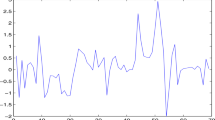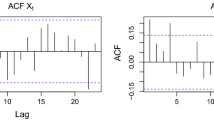Abstract
This paper studies the threshold estimation of a TAR model when the underlying threshold parameter is a random variable. It is shown that the Bayesian estimator is consistent and its limit distribution is expressed in terms of a limit likelihood ratio. Furthermore, convergence of moments of the estimators is also established. The limit distribution can be computed via explicit simulations from which testing and inference for the threshold parameter can be conducted. The obtained results are illustrated with numerical simulations.
Similar content being viewed by others
References
Bradley RC (2007) Introduction to strong mixing conditions. Kendrick Press, Heber City
Brockwell RJ (1994) On continuous time threshold ARMA processes. J Stat Plan Inference 39: 291–304
Chan KS (1993) Consistency and limiting distribution of the LSE of a TAR. Ann Stat 21: 520–533
Chan KS, Tong H (1986) A note on certain integral equations associated with nonlinear time series analysis. Probab Theory Relat Fields 73: 153–159
Chan KS, Tong H (1987) A note on embedding a discrete parameter ARMA model in a continuous parameter ARMA model. J Time Ser Anal 8: 277–281
Chen R, Tsay R (1991) On the ergodicity of TAR(1) processes. Ann Appl Probab 1: 613–634
Dedeker J, Doukhan P (2003) A new covariance inequality and applications. Stoch Process Appl 106: 63–80
Doukhan P (1994) Mixing. Springer, New York
Fan J, Yao Q (2003) Nonlinear time series: nonparametric and parametric methods. Springer, New York
Geweke J, Terui N (1993) Bayesian threshold autoregressive models for nonlinear time series. J Time Ser Anal 14(5): 441–454
Hansen BE (1997) Inference in TAR models. In: Studies in nonlinear dynamics and econometrics, vol 2. Berkeley Electronic Press, Berkeley, pp 1–14
Hansen BE (2000) Sample splitting and threshold estimation. Econometrica 68: 575–603
Ibragimov IA, Khasminskii RZ (1981) Statistical estimation. Springer, New York
Kutoyants YuA (2004) Statistical inference for ergodic diffusion processes. Springer, London
Kutoyants YuA (2010) On identification of the threshold diffusion processes. Ann Inst Stat Math 62: 1–31
Stramer O, Brockwell PJ, Tweedie RL (1996) Continuous time threshold AR(1) processes. Adv Appl Probab 28: 728–746
Taniguchi M (2008) Non-regular estimation theory for piecewise continuous spectral densities. Stoch Process Appl 118: 153–170
Tong H (1990) Non-linear time series: a dynamical systems approach. Oxford University Press, Oxford
Author information
Authors and Affiliations
Corresponding author
Rights and permissions
About this article
Cite this article
Chan, N.H., Kutoyants, Y.A. On parameter estimation of threshold autoregressive models. Stat Inference Stoch Process 15, 81–104 (2012). https://doi.org/10.1007/s11203-011-9064-0
Received:
Accepted:
Published:
Issue Date:
DOI: https://doi.org/10.1007/s11203-011-9064-0
Keywords
- Bayesian estimator
- Continuous-time diffusion
- Compound Poisson process
- Limit distribution
- Limit likelihood ratio
- Nonlinear threshold models




